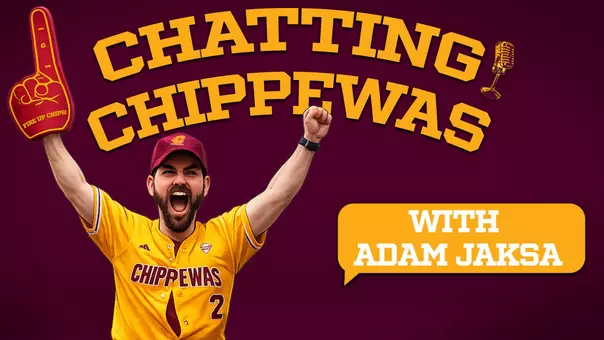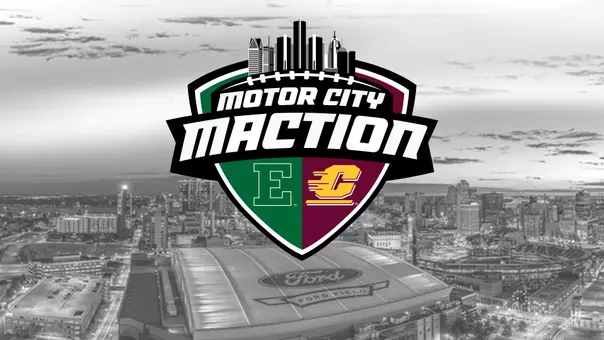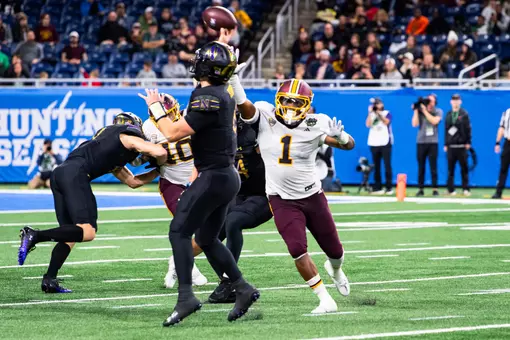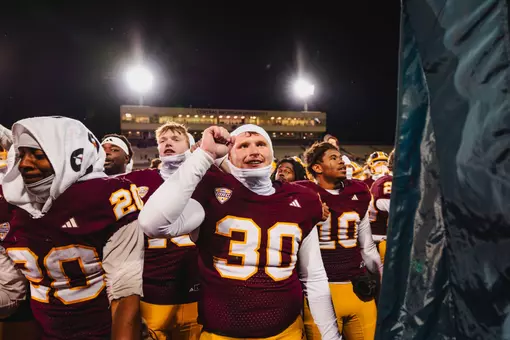Central Michigan University Athletics
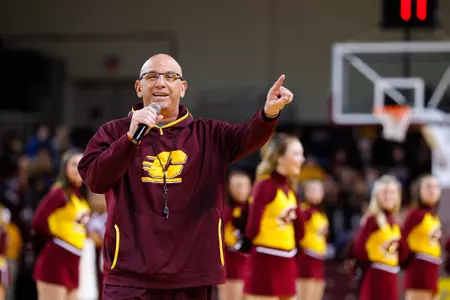
Q&A With Coach Bonamego
12/4/2015 12:00:00 AM | Football
The Central Michigan football team will learn Sunday where it is headed for a bowl game. Under first-year coach John Bonamego, the Chippewas are 7-5 and finished 6-2 in the Mid-American Conference, tied for first place in the West Division. CMUChippewas.com sat down with Chippewa Bonamego this week.
CMUChippewas.com: What is this week been like in terms of preparation for an unknown opponent, an unknown destination?
John Bonamego: We're giving the starters some time off, and we're going to have some practices with our younger guys. We really go back and re-install some things from a fundamental standpoint, our basic system, and really re-teach to our younger players, most of whom have been on scout teams all year, our system. And they're not long practices. They're relatively short, crisp, with a high emphasis on the individual fundamental and techniques. So it will be a lot of individual time with the coaches, with them working their techniques. We're also full swing into recruiting right now, so half the staff is here working with the players and the other half is out on the road, and we'll fill in the gaps with the graduate assistants. There's a lot of work to be done. Once we find out who we're playing then we'll start to focus more on the game plan.
CMUChippewas.com: Earning your way into a bowl game can be beneficial on a number of levels for any college football program. How valuable is it to yours?
Bonamego: By rule you're given 15 more practice opportunities, which is exactly what you get in spring practice. So it's very, very valuable to us. Success in college football - you have to recruit well, but you also have to retain people and you have to develop them. And development is in the weight room, it's physically, but it's also fundamentally as well, so to have that extra time is very beneficial for us.
CMUChippewas.com: You have been through an awful lot over the past 10 months, from landing what you've called your dream job, to cancer diagnosis and treatment, to losing a player, Derrick Nash, to cancer, to the death of team physician Dr. Jason Davenport, to the season itself, your first as a college head coach. How has it all affected John Bonamego?
Bonamego: I would like to think that as a person it hasn't changed me that much because I feel like I've always genuinely been appreciative of the opportunities that I've had and of the people that are around me. I think that anytime you lose people who are close to you, anytime you're faced with a potentially life-threatening illness, you can't help but to kind of step back and just … well it puts things into perspective for you in terms of just how fragile life is and what a wonderful gift it is and just how appreciative I am of everyone who's in my life, starting first with my family, with my wife Paulette and my three children, Javi, Gio and Bellina. Also my in-laws and my parents, and then the young men and coaches that are in our program. It's a privilege to be around them every day and to watch them grow and develop on and off the field. So when you ask how have I changed, hopefully I haven't changed, but if I have changed at all it's for the better. I don't think I could be more appreciative, but probably I am a little more appreciative, or at least more aware. When your own mortality is brought into question, it definitely heightens your awareness. As a coach, I think that in any profession where you're challenged every day, you're trying to improve - the same thing I ask the players to do and the coaches to do is to just get better every day. And I think that's the same thing I ask of myself: Did I get better today? So I'm learning all the time, and so I would say that I'm growing into this role and I have a much keener appreciation and understanding of the total scope of it because it's much vaster, wider, deeper than what I had initially anticipated. There's a lot more to it. You wear an awful lot of hats and you have to wear them all equally well. I don't think anything that you do in the coaching profession completely prepares you for that responsibility, because it's not just about the game, it's about everything. It's about recruiting, it's about managing your staff, it's about knowing your personnel, it's about managing the players on the field and off the field, it's about mentoring players on the field and off the field, it's team building, it's fundraising, it's public relations, it's working with the media. And I say working with the media. You know some people say you have to deal with the media and I don't agree with that. I mean, I think you work with the media just like you work with the faculty and administration and every other facet. Ultimately, we're all here for the same reason, and that's to develop young people and to prepare them to be successful in life - and then also to win football games. But it's a huge undertaking. When you delve into it and you think about it, you have an understanding, but until you actually get into it, you don't realize how involved it truly is.
CMUChippewas.com: Talking from strictly a coaching perspective, rate how things evolved for you from last February when you were named the head coach until now. A scale from 1-to-10, with 1 being what it was you expected and 10 being 180 degrees different from what you expected.
Bonamego: I would say probably a 3 or 4. A lot of things are what I thought it was going to be. Staff is probably the single most important thing, and I think I hit a homerun with the coaching staff. Because you want good teachers and you want good coaches, but you also want great people. I wanted people that had a like-minded vision to myself. I didn't have to keep anybody. That wasn't a stipulation. You know, I saw that in the media where one other candidate pulled out because it was rumored that he had to keep the whole staff. That wasn't the case at all. I just felt like keeping the staff that I did was just what made sense, especially after I got to meet them. And then adding staff, that's just such an important part of it. If you get the right people, it takes a lot of pressure off you as a head coach. I want to create an environment where the players and coaches enjoy coming to work, because I know that in organizations that I've been in, that's where I was always the happiest. And the best way to do that is to hire competent people and then trust them to do their job. Let them do their job and then sit back and watch, and if you have to step in, you step in. But I think hiring the right people is very important and it's helped me a great deal.
CMUChippewas.com: Anything, looking back, that you would have done differently?
Bonamego: I think you always self-evaluate after everything. I can't think of anything that I would really do much differently. I really don't. I wouldn't have gotten sick.
CMUChippewas.com: Again, speaking from a strictly football perspective, what was the biggest challenge you faced?
Bonamego: The biggest challenge is probably, for every coach, is to prepare your team and try to get them to play as hard as they can every week. It's challenging because you go through the ups and the downs of the season and these kids have a lot on their plate: Their families back home, their personal lives, they have academics that are very important. Balancing all that, trying to determine how much you can put on them, how much they can realistically handle, those are the challenges. Week in and week out, how much can you put on their plate? You don't want to starve them, but you don't want to bloat them either, you don't want to weigh them down. And I think everybody probably faces those same challenges. When you're trying to evaluate what are we doing, what do we need to do to win and are we doing enough. Those are the daily challenges you have as a coach.
CMUChippewas.com: Naturally, there were myriad questions about the 2015 Central Michigan Chippewas coming into the season, as there are in any program with a new man in charge. You were picked to finish fifth in the MAC West, yet you finished with a share of the title. Looking back, do you feel like you exceeded expectations?
Bonamego: I think we can be proud of a lot of things we accomplished. I can assure everyone that nobody's expectations of the program will ever exceed what my expectations are. As so, I don't really pay much attention to (outside expectations), and I said it at the beginning of the year. I don't pay any attention to pre-season predictions. To me, that's just something to write about at that time of the year before you start playing games. The champion gets decided by who earns the right to play in that championship game, and it's earned on the field every game day. And it's not about how other people perceive you, it's about how you go out and perform. Ultimately, that's the great thing about the game. You get to go out and if they pick you fifth, that's great. We get to go and prove them wrong. If they pick you first, OK, we get to go prove them right. It never really changes how you go into a season or what your expectations are. I mean I look at our season and we lost two games by a total of seven points. And then if you want to look at the other side of the coin, we probably won three more games by a total of seven points or whatever. I'm not satisfied, but I'm not disappointed either. I think we still have a lot of work to do. There are a lot of areas in our game that we still need to address and we need to improve on. It's a perpetual process. It never ever ends. That's the thing about this job - once you step on this hamster wheel, you just keep going. You roll right from one phase into the other. It's the same in the NFL. It just keeps on going. You step off for some brief times to maybe catch your breath, get a little short vacation, but other than that it just keeps on going.
CMUChippewas.com: Before coming to CMU, you had spent 16 years in the NFL. Before that, you were a college assistant. One of the major differences in coaching at the college level as opposed to the NFL is recruiting. How have you adjusted?
Bonamego: You have to recruit, obviously. It's the lifeblood of your program, and I've always enjoyed recruiting. And I'm still evaluating our whole process of how we generate names and how we put out offers. That's something that I'm looking to improve upon. That's something I'm going to do, spend time researching in the off-season. You know, I came in here and the class was already signed. I got here after signing day, so I was fortunate in that regard. And then this year's class is a small class. We don't have many open scholarships at all, so it's a big difference between going out and having to sign 20, compared to having to go out and signing nine or 10. The timing really, and the way that things fell, really works to my advantage and to our advantage because we get to test the waters a little bit and then really kind of feel out what works and what doesn't work. You know, recruiting really hasn't changed all that much. The timetable has. Things are much more accelerated now and the mediums that we use to communicate with prospects have changed. I didn't have a Twitter until 10 months ago and now I'm on there all the time. But it still comes down to having a product and trying to sell your product. And I'm very fortunate that, in my case, Central Michigan football is something that is very easy for me to sell because I'm very highly passionate about it. And as I've stated before, it's my full intention to be here as long as I'm wanted and appreciated around here. You're not going to see my name floating around for other jobs and that sort of thing because this is where I want to be. And I think there's a lot of value to that for prospective recruits. You know, when I came here 30-plus years ago (as a student-athlete), I knew that Herb Deromedi was going to be our football coach, and he's still around here. There's already been some (coaching) movement in our conference, and in all likelihood there's going to be more movement in our conference here in the next couple weeks. I think recruiting comes down to, again, selling a product. But it's more than that. It's relationships with coaches, with prospects, with prospects' parents, and I think sincerity goes a long way in that process. I think kids are smart enough to understand when someone is really sincere and when someone is just trying to get them to jump in the boat.


